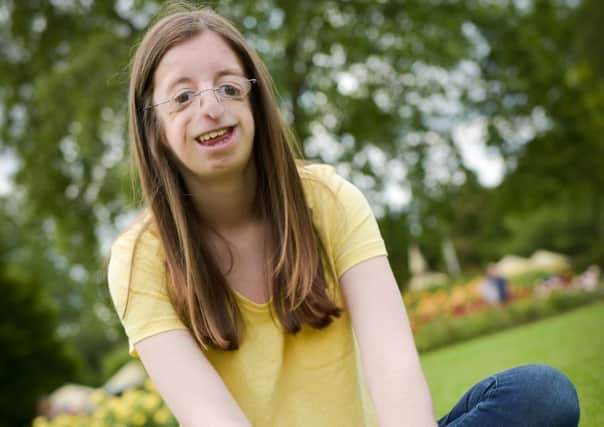Student Lucy is a true inspiration to her peers


From birth, Lucy has been profoundly deaf with a little-known disease that causes facial disfigurement and a myriad of related health issues and complications.
Yet, the face she sees looking back at her in the mirror is of a smiling, confident, vivacious, sociable young woman with a lust for life and a wanderlust that already has her jetting off to foreign climes.
Advertisement
Hide AdAdvertisement
Hide Ad“I don’t remember name calling or anything at school,” says the 18-year-old from Newton Mearns. “I went to Hazeldene Nursery. Then I went to Craigholme and I don’t remember any bad experiences there.”


Of course, from very early on, Lucy has developed a robust coping mechanism that has helped her flourish into such an outgoing, charismatic character.
“I learned to blank things out,” she says. “I only notice people staring when others point it out to me. “They’ll say, ‘doesn’t that bother you?’ and then I’m aware of it but I find it easy to just blank things like that out.”
From a child, she has refused to be defined by being born with Treacher Collins syndrome. Her parents were told that Lucy would not be able to hear, have a “normal” childhood or attend mainstream schools.
Advertisement
Hide AdAdvertisement
Hide AdHer parents were warned that Lucy faced a life of being unable to talk properly or live on her own as an adult. Yet, she has proven the establishment wrong, thanks to a loving and nurturing family and a small but life-changing device that has given her the sense of hearing.
That and a parliament of ear, nose and throat specialists, respiratory consultants, maxillofacial surgeon, audiologists and the list goes on.
Treacher Collins syndrome affects the development of bones and other tissues of the face, which means that Lucy was born without external ears and with small cheek bones, jaw and chin.
It also gave her restricted airways, which presented life-threatening respiratory problems when she was younger.
Advertisement
Hide AdAdvertisement
Hide AdAnd, when she was a baby, Lucy had to be tube-fed, unable to suck from a bottle, because of a membrane blockage in her nose.
She underwent numerous operations and, from the age of 13, had to sleep wearing a ventilator mask for sleep apnoea — a condition that interrupts normal breathing during sleep. All this and dyslexia, too.
Lucy hated having surgery, albeit she knew how essential these operations. And, these gave her a phobia of facemasks.
“I couldn’t bear to wear the sleep apnoea mask at night,” she recalls. “It reminded me of all the surgery. I had to go through a lot of sessions with a psychologist to try to overcome my dread of the mask.”
Advertisement
Hide AdAdvertisement
Hide AdOver the years, Lucy has had 20 operations and procedures to make breathing, eating and hearing easier. Her delightful voice is the product of years of speech therapy and she was one of the youngest children to receive a Cochlear Baha implant — a small sound processor — at just two years of age,.
Having the Cochlear System has allowed Lucy to achieve all of her ambitions. “I don’t look in the mirror all the time, and it helps me to forget that I’m different to other people and I can do pretty much everything that anyone else can do. I can’t swim or shower with it, but that’s about all,” she says.
Lucy is the latest recipient of the Cochlear award for people who have surpassed adversity to help with education funding.
Far from shying away from the limelight, Lucy has sung in a choir in front of thousands of people, strutted the catwalk in a school fashion show, and she’s been a scout leader and represented her school in tennis and hockey.
Advertisement
Hide AdAdvertisement
Hide AdLife would have been very much harder for Lucy if she had not had the Baha implant and needed to rely on lip reading, face and hand gestures or sign language.
Jim Harrigan, head of paediatric audiology at Glasgow’s Royal Hospital for Sick Children, has said that Lucy had been inspirational during her 10 years as his patient. He added: “She coped extremely well, despite all her extra complications, her facial surgery and breathing problems. Nothing seems too much of a challenge for her.”
Lucy thrived throughout her education, where she built up a strong network of friends.
Now, in her second year studying for a business management and marketing degree at Robert Gordon university in Dundee, she will embark on a six-month stint in Germany as part of her degree’s work experience in September, despite a minor complication: “I don’t speak any German,” she says without a hint of concern.